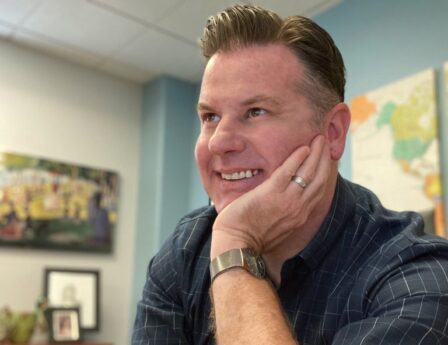Daniel Gillen Recognized for Statistical Methods Research and Impact on Public Health

On April 18, 2024, Daniel Gillen was named a fellow of the American Association for the Advancement of Science (AAAS), the world’s largest general scientific society. Gillen, a Chancellor’s Professor and chair of Statistics in UC Irvine’s Donald Bren School of Information and Computer Sciences (ICS), was recognized for distinguished contributions to statistical methods. Specifically, he was honored for research on survival and longitudinal data analysis methods, and clinical trials methodology and implementation, as well as for impactful collaborative work in drug development, regulatory policy and epidemiology.
“My research is divided into two parts: the development of new statistical theory and methodologies to better address scientific problems, and the application of those methods to public health-focused research,” says Gillen. He explains that much of his group’s work lately has been devoted to biomarker discovery for Alzheimer’s disease (AD) and increasing diversity in AD clinical trials to better address health disparities in the field.
“When we evaluate new disease therapies, we are generally evaluating them on primarily non-Hispanic white populations that are pretty well educated and well off,” says Gillen. “We don’t necessarily know if new therapies work equally well across all groups.” His approach to addressing this shortfall is two-fold, as he works to diversify both clinical trial recruitment and biomarker development.
Diversifying Recruitment & Biomarker Development
Gillen is a principal investigator on a $3.7M National Institutes of Health grant awarded to UCI that aims to diversify study cohorts by increasing recruitment in disadvantaged neighborhoods. “Our research design over-samples people in neighborhoods with high health disparity indices and will ultimately determine what strategies work when inviting them into research,” says Gillen. Using randomized trials, they are testing strategies such as using Facebook ads or postcards, in combination with different languages, to determine what works best in recruiting more diverse populations to participate in clinical trials run by UCI.
“My job is to design those studies to allow for increased statistical efficiency to better quantify differences in the effect of a given intervention across low and high disparity populations,” says Gillen. But it doesn’t stop there. They are also developing new statistical methodology to validly estimate the effect of a given intervention and ensure the generalizability of their results. “In this context we are developing novel methods for something called ‘interrupted time series,’ where we seek to infer points of inflection in recruitment outcomes — what’s working and what’s not over time — as we implement new intervention strategies.”
When it comes to more inclusive biomarker development, Gillen is researching alternative sampling designs, especially related to interventions for AD. Candidate AD biomarkers often require burdensome and costly measurements based on either cerebral spinal fluid or PET scan results. “As you can imagine, participants aren’t necessarily eager to get cerebral spinal fluid taken,” says Gillen. “You want to use those resources as efficiently as possible, so we oversample people who have progressed to dementia as well as those from underrepresented groups. By statistically accounting for this intentionally biased sampling, our group is able to validly estimate biomarker effects for the overall population, while ensuring that we maximize all possible information on groups historically underrepresented in research.” They achieve this through something called “inverse probability of sampling weights.” As Gillen explains, “my research involves ways to incorporate these weights and to develop the asymptotic theory of our estimators to ensure that we are making valid probabilistic statements regarding the role of biomarkers.”
Ensuring Safety and Ethics
Gillen has also served as an advisor to the U.S. Food & Drug Administration (FDA) for approximately 20 years. In this role, he advises the FDA on controversial clinical trial results as interventions are being reviewed for potential approval. His statistics and probability research guides his advice to the FDA as they try to weigh the “risk:benefit” profile of new therapies in the face of uncertainty.
In addition, Gillen works with a multitude of pharmaceutical companies on the appropriate design and monitoring of internationally run clinical trials. He has served on over 80 independent data monitoring committees (IDMCs) for industry-sponsored multicenter clinical trials in disease areas ranging from Pompe disease to breast cancer to cardiovascular disease. As an IDMC member, he serves as an independent reviewer of incoming trial data to protect the safety and ethics of patients participating in the study.
“My role as an academic statistician is crucial to the goals of an IDMC. My expertise in statistics and probability provides me with a unique ability to not only efficiently design trials but also to monitor them for safety and efficacy in order to determine if there is a need for interim trial modifications or early stoppage,” says Gillen. “As clinical trial data accrues during the course of a study, our estimates of safety and efficacy are typically highly variable, so my role as a statistician is of utmost importance when interpreting these results and making decisions about the future conduct of the trial in order to protect participants.”
Gillen was pleased and humbled to be named a AAAS Fellow, noting that it’s also an acknowledgment of the work of his collaborators and students. He is most proud of the fact that this esteemed recognition highlights and recognizes the practical implications of statistics.
“It’s good to see statisticians acknowledged not only for the mathematical and theoretical developments that we have made, but also for the impact of our research on other sciences,” says Gillen. “To me, that’s a guiding principle of statistical research — not just developing theory for theories sake, but being able to translate it to, in my case, the mission of public health.”
— Shani Murray